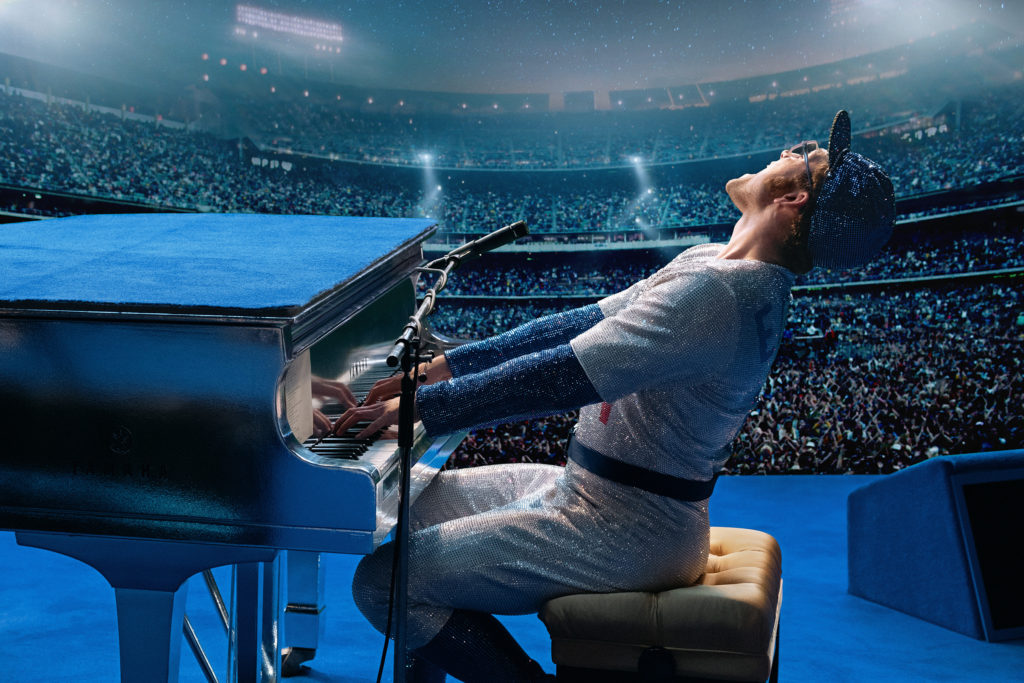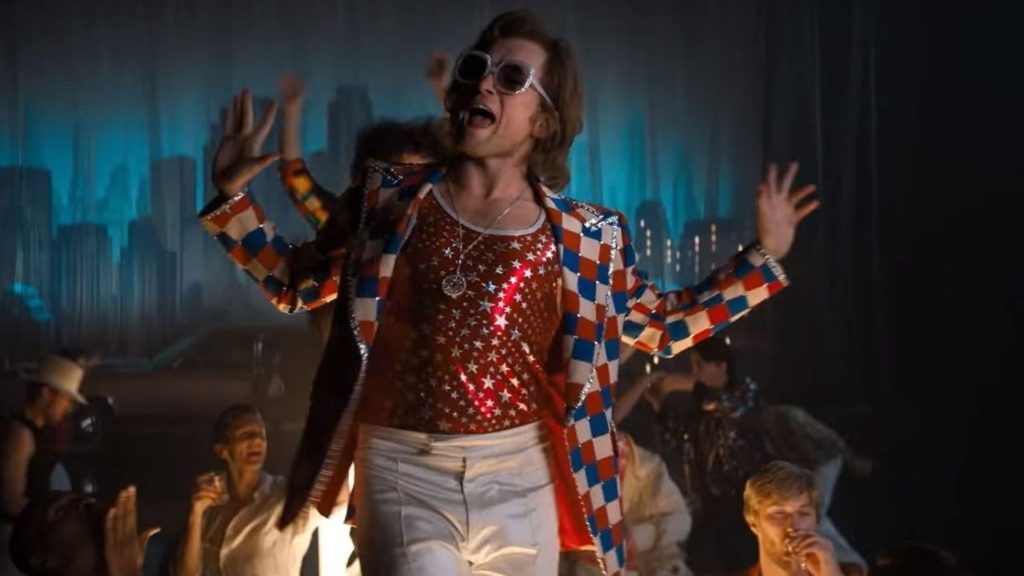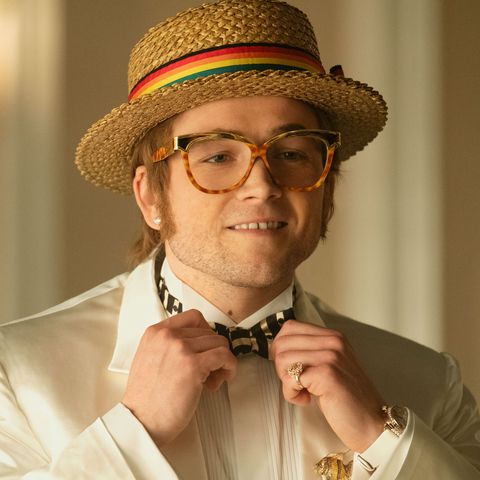Rocketman (2019)

DIRECTOR: Dexter Fletcher
CAST: Taron Egerton, Jamie Bell, Richard Madden, Bryce Dallas Howard
REVIEW:
Is someone in Hollywood trying to build a ’70s rock star cinematic universe? Close on the heels of last year’s Oscar-winning (albeit somewhat overrated) Bohemian Rhapsody, now comes Rocketman, covering one of the few ’70s-’80s musical icons who rivaled or surpassed Freddie Mercury for over-the-top flamboyance: Elton John. Director Dexter Fletcher, who took over finishing up Bohemian Rhapsody in place of a fired Bryan Singer but gets full creative control here, takes a different approach, styling Rocketman as a musical fantasy rather than a strictly conventional biopic. And of course, like Bohemian Rhapsody, Rocketman will take some nostalgic fans of the featured artist down memory lane.
Most of the film takes place in flashback, with occasional returns to Elton John (Taron Egerton) relating his life story to a sharing circle in rehab. “Elton Hercules John”, as he eventually styles himself, is originally Reggie Dwight, a shy, awkward English boy growing up with a self-absorbed mother (Bryce Dallas Howard) and a cold and distant father (Steven Mackintosh) who is unwilling or unable to show affection. The only supportive figure in his childhood is his grandmother (Gemma Jones), who sends him to a prestigious music school when young Reggie proves a prodigy on the piano. Reggie grows up playing for crowds in pubs and providing piano backup to visiting American jazz bands, but his own ticket to breaking out comes when he meets songwriter Bernie Taupin (Jamie Bell), who will become his longtime lyricist and best—sometimes only—friend (Taupin’s hand in Elton’s success cannot be underestimated, and the two men are inextricably linked; with the exception of Elton’s cover of The Who’s Pinball Wizard, every one of the many songs featured in the movie was either written entirely by Taupin or co-written by Taupin and Elton). The two hit it off so quickly and become so inseparable that Bernie would be obvious “love interest” material, except that while Reggie is a homosexual, Bernie is straight. Soon, Reggie has dubbed himself Elton John, donned an ever-increasingly flamboyant persona including a revolving door of over-the-top costumes, and caught the attention of both studio executives and John Reid (Richard Madden), who becomes both his manager and lover. But as is often the case, Elton eventually loses his way in a haze of “sex, drugs, and rock and roll”, descending into a self-destructive spiral including overdoses, hospitalization, a suicide attempt, and an ill-advised and short-lived marriage (to a woman). His initially heady affair with Reid turns toxic as Reid reveals himself to be more concerned with the money Elton makes him than with Elton’s own well-being, while Elton’s erratic and diva-ish behavior alienates him from Taupin. All things considered, while Rocketman doesn’t pretend to be strictly rooted in reality, it’s an achievement in and of itself that Elton was churning out so many hits even amidst an avalanche of personal issues. Ultimately, however, the party’s over, and Elton is left introspective and reflective, facing his demons in rehab (history shows he made a triumphant comeback, reuniting with Taupin and retaking the stage clean and sober).

It’s impossible to deny the similarities between Bohemian Rhapsody and Rocketman, especially with the two movies coming in fairly close succession. Both tell the (mostly) true story of a real-life flamboyantly gay 1970s-1980s musical icon. Both follow a typical musical biopic formula of following the central character from a small-time artist to making it big, to losing their way in “sex, drugs, and rock and roll”, to eventually cleaning up their act and making a triumphant return (with Bohemian Rhapsody, it was Live Aid, here it’s Elton singing and dancing his way down the hall and out the door of the rehab clinic and into an almost uncanny reenactment of his music video to “I’m Still Standing”). Both even feature a “villain” in the form of the central character’s manager/lover. In Bohemian Rhapsody it was Allen Leech’s Paul Prenter, while here it’s Richard Madden’s John Reid (there’s a further irony in that John Reid also appeared as a character in Bohemian Rhapsody, and both versions were played by Game of Thrones alumni, there by Aidan “Littlefinger” Gillen and here by Richard “Robb Stark” Madden). In fact, Fletcher reportedly even considered giving Rami Malek’s Freddie Mercury a cameo here. The biggest difference is in the approach. Finally having full creative control every step of the way rather than being brought in late to clean up after a sacked director, as was the case with Bohemian Rhapsody, Dexter Fletcher has styled Rocketman not as a straight conventional biopic, but as a musical, including musical fantasy sequences and other characters breaking into song and choreographed numbers. When Elton performs “Crocodile Rock” at the Troubadour, Elton and the audience float up weightlessly from the ground, as if swept off their feet by the music. While Taron Egerton’s singing is front-and-center, the musical fantasy sequences mean that his co-stars Richard Madden, Jamie Bell, Bryce Dallas Howard, and others also occasionally join in (“Honky Cat” is performed as a duet/montage between Egerton and Madden, while Bell sings the song Taupin wrote, “Goodbye Yellowbrick Road”). Songs are also used as transitions in passage of time; when a pub fight breaks out in Reggie/Elton’s youth, the child Reggie (Kit Connor) sings “Saturday Night’s All Right for Fighting”, then is swapped out halfway through with Taron Egerton. The titular song, “Rocketman”, is performed as a slightly trippy fantasy sequence during a drug-fueled suicide attempt, partially as a duet between Elton and his childhood self (part of a running theme of the main character reconciling the “Reggie” and “Elton” sides of himself, using the flamboyant, over-the-top bravado of “Elton John” to hide the shy, insecure Reggie underneath) and ends with him literally shooting into space like a rocket. Fans of Elton’s considerable musical output will find Rocketman a sometimes rousing experience, with most of his best-known songs featured either in full or in part, although the emphasis is on the 1970s (no song released later than 1983-84 is included). Some songs, including “Benny and the Jets” and “Don’t Go Breaking My Heart” (featuring Rachel Muldoon as Kiki Dee) get only short snippets as interludes and scene transitions, but others, including “Tiny Dancer”, “Crocodile Rock”, “Honky Cat”, “Rocketman”, and “I’m Still Standing” are featured in their entirety or nearly so. Those who accused Bohemian Rhapsody of trying to gloss over or whitewash its main character’s gayness (a criticism which I did not, for the most part, agree with) are unlikely to make the same complaint here. The filmmakers fought for and obtained an R rating (the studio initially wanted to tone down some aspects to rate it PG-13) with the approval of producer Elton John himself, who quipped that he hasn’t led a “PG-13 life” (considering that he was involved in the production, I suppose Elton deserves some credit for supporting a “warts-and-all” portrayal of himself). Bohemian Rhapsody alluded to Freddie’s drug-fueled parties/orgies but skipped the details, but Rocketman doesn’t shy away from Elton snorting cocaine, washing down pills with booze, or joining an orgy (if anything, it might arguably spend a little too much time lingering on Elton’s wallowing in debauchery). Unlike Bohemian Rhapsody, which left any gay sex offscreen, it also features a quick but frank sex scene between Taron Egerton and Richard Madden.

It remains to be seen what the next Academy Awards will entail, but if Rami Malek can receive an Oscar for Bohemian Rhapsody (which I, personally, felt was overrating his performance just a tad), then Taron Egerton deserves to be at least included among the nominees. It’s the kind of wholly committed, immersive performance in which the actor submerges themselves in their character (an additional challenge when sinking under the skin of a famous real-life individual). Egerton has previously shown some charisma and screen presence—if not necessarily a great deal of range—in roles like the Kingsman franchise, but here he makes a forceful case for himself as a serious actor, downplaying his good looks behind Elton John’s oversized glasses, balding head, and outrageous outfits (he even adopts Elton’s tooth gap with a little makeup trickery) and performing all of his own singing (unlike Malek, who lip-synced to the real Mercury’s vocals). His voice isn’t always identical to the real Elton’s, but his singing is more than capable and there are times when his Elton impersonation is spot-on or nearly so (he nails “Tiny Dancer” and “I’m Still Standing”). Likewise, Egerton is not a dead-ringer for Elton, but between the singing and the donning of Elton’s many outfits, the illusion is good enough to not break the spell (partly in order to not undermine Egerton, the real Elton John’s voice is not heard until the end credits, when he duets with Egerton on the original song “I’m Gonna Love Me Again”). More importantly, Egerton dives into the role with fully committed immersion, verve, and exuberance, not shying away from anything the role entails, and capturing both Elton’s public flamboyance and quieter, more subdued moments (especially his heartache during a poignant late meeting with his father). He’s backed up by strong supporting performances, primarily from Richard Madden, who plays John Reid with enough suave charm to make it easily understandable how Elton might fall for him before the mask starts to slip to reveal the cold, callous interior, and Jamie Bell, whose Bernie Taupin is the character onhand who most qualifies for sainthood, accepting Elton as he is and doing his best to help even when he is forced to watch from the sidelines with dismay as Elton self-destructs. One is left with the impression that they’d be harmonious soulmates if not for the fact that Taupin is straight (the movie suggests this thought also occurred to Elton, who reacts jealously to Taupin getting a girlfriend, and directs “Your Song” toward him). Other smaller supporting roles include Bryce Dallas Howard, sporting a credible British accent, as Elton’s emotionally indifferent, self-absorbed mother, an almost unrecognizable Stephen Graham as Elton’s first manager, and Tate Donovan as Troubadour owner Doug Weston.
Rocketman is a lively and at times infectiously entertaining experience with the kind of flair only a well-executed musical can achieve, but it’s not perfect. The climax, where Elton is “visited” in his rehab sharing circle by apparitions of all the key players in his life story—his parents, Bernie, and Reid—to symbolically find closure and catharsis with each of them, is a bit too trite and cutesy in the way it wraps up his issues with each of them. There are times when the staging of the film as a musical with people breaking into song gets a little excessive. But while Rocketman doesn’t completely achieve escape velocity from the constraints of the standard-issue musical biopic, nor is it slavishly beholden to them. Although the movie is likely to be embraced by those with a nostalgic love for Elton John’s music, it’s also capable of appealing to casual fans or neophytes and that, coupled with Dexter Fletcher’s offbeat stylistic/narrative choices and sense of flair, and Taron Egerton’s committed, immersive performance, makes it a trip to the theater worth taking for those to whom the subject matter appeals.
* * *